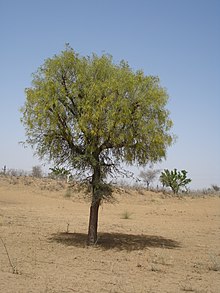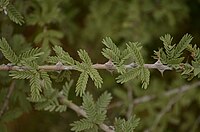Vanakam and blessed day to all,
Limited Vanni plants for sale.
+60129259495
Pick up in Klang Valley. Delivery in Klang Valley can be arranged. There will be a transportation cost for it.
+60129259495
As a human being , in your life you need to plants this sacred plant in the temples. It is a great blessings to you and your family not only in this birth , it goes to at least 7 generation.
+60129259495
So buy and plant it in your hand in temples.
+60129259495
So WhatsApp/Sms asap to +60129259495 to book and confirm your order.
Please share with your friends.
Prosopis cineraria
From Wikipedia, the free encyclopedia
| Prosopis cineraria | |
|---|---|
 | |
| Scientific classification | |
| Kingdom: | Plantae |
| (unranked): | Angiosperms |
| (unranked): | Eudicots |
| (unranked): | Rosids |
| Order: | Fabales |
| Family: | Fabaceae |
| Genus: | Prosopis |
| Species: | P. cineraria |
| Binomial name | |
| Prosopis cineraria (L.) Druce | |
| Synonyms | |
Prosopis cineraria is a species of flowering tree in the pea family, Fabaceae. It is native to arid portions of Western Asia and the Indian Subcontinent, including Afghanistan, Iran, India, Oman, Pakistan, Saudi Arabia, the United Arab Emirates, and Yemen. It is an established introduced species in parts of Southeast Asia, including Indonesia.[1] Common names include Ghaf' (Arabic);[2] Khejri or "Loong Tree" [3](Rajasthan); Janty(जांटी) (Bishnois); Kahoor (Balochi); Kandi (Sindh); Banni (Kannada);Gandasein(Burmese); Vanni (Tamil); Jammi(Telugu); Chaunkra,[1] Jant/Janti, Khar,[1] Khejri/Khejra,[1] Sami, Shami (Marathi)and (Hindi);[4] Sumri (Gujarat); Vanni-andara, Katu andara, Kalapu andara, Lunu andara (Sinhala).
It is the state tree of Rajasthan (India. A large and well known example of the species is the Tree of Life in Bahrain – approximately 400 years old and growing in a desert devoid of any obvious sources of water.
It is also the national tree of the United Arab Emirates. Through the Give a Ghaf campaign its citizens are urged to plant it in their gardens to combat desertification and to preserve their country's heritage.[5] In Sri Lanka the mesquite Prosopis juliflora native to Central and South America is also known as katu andara. It was introduced in 1880 and has become a serious problem as an invasive species.[6]
Description
P. cineraria is a small tree, ranging in height from 3 – 5 m. Leaves are bipinnate, with 7 – 14 leaflets on each of 1 – 3 pinnae. Branches are thorned along the internodes. Flowers are small and creamy-yellow, and followed by seeds in pods. The tree is found in extremely arid conditions, with rainfall as low as 150mm annually; but is indicative of the presence of a deep water table. As with some otherProsopis spp., P. cineraria has demonstrated a tolerance of highly alkaline and saline environments.[7]
Uses
The wood of P. cineraria is a good fuel source, and provides excellent charcoal plus firewood, fodder, green manure and goat-proof thorny fences.[4][7][8]
The leaves, called "Loong" in India and pods are consumed by livestock and are a beneficial forage.[4][7] In Rajasthan, India, P. cineraria is grown in an agroforestry setting in conjunction with millet.[7] The tree is well-suited for an agroforestry setting, because it has a single-layered canopy, it is a nitrogen fixer (thus enriching the soil), and its deep roots avoid competition for water with crops.[4]
Khejari(Prosopis cineraria) fruits or pods are locally called sangar or sangri. The dried pods locally called Kho-Kha are eaten. Dried pods also form rich animal feed, which is liked by all livestock. Green pods also form rich animal feed, which is prepared by drying the young boiled pods. The dried green sangri is used as a delicious dried vegetable which is very costly (Nearly Rs.400 per kg in market). Many Rajasthani families use the green and unripe pods (sangri) in preparation of curries and pickles.[9]
Om Namasivaya
Sivajnani Nagappan
www.arthadharma.net
+60129259495



No comments:
Post a Comment